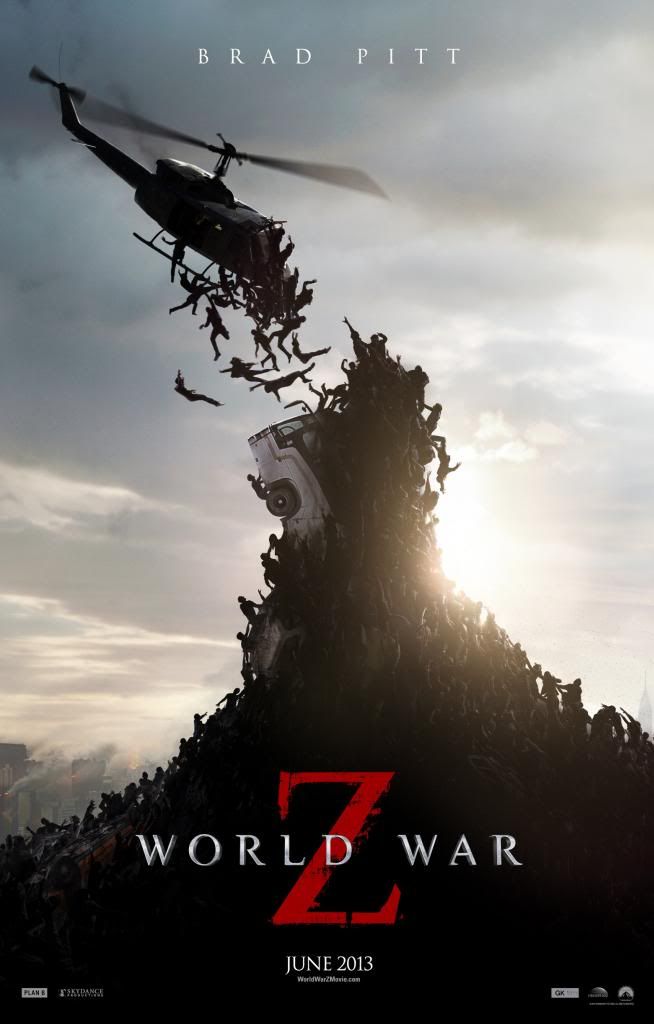It's Brad Pitt versus the 'zombie apocalypse' in Marc
Forster's 'World War Z,' which took its name from Max Brook's masterpiece of pseudo
non-fiction, an oral history and geopolitical analysis of the worldwide zombie war told from the
perspective of a member of the UN Postwar Commission (Brooks himself) who traveled around the world
collecting first-hand accounts from survivors a decade after the global cataclysmic
event. The movie's production problems are well documented, which resulted in a major shift in its narrative format, not to mention
script rewrites and numerous reshoots which ballooned its budget to around $200
million.
While Brooks's narrative structure comprised of a series of
snapshots of the zombie apocalypse from key participants at various points of the
world, the movie took a more linear approach by focusing solely on the
journey and experiences of Gerry Lane (Brad Pitt), a former UN 'hot-spot' investigator
reluctantly called out of retirement to investigate the cause of the global
pandemic. If you drop the conceit
that the movie is a faithful adaptation of Max Brooks's novel and see it for
what it actually is, which is a movie loosely based on the book, or a movie
that's only 'inspired' by the book, you might enjoy it a little bit more.
Brad Pitt is in fine form here, grounding the movie with a
sympathetic and believable protagonist battling to save his family and, by
extension, the rest of the human race. And
as Segen, a young Israeli soldier who crossed path with Pitt's character through a confluence
of unfortunate events, newcomer Daniella Kertesz reminded me of a spunky young Lori
Petty (aka Tank Girl) with her rebellious, feisty 'don't mess with me' post-punk
feminism.
Tight, well-paced and riveting, WWZ worked for me because, despite
its obvious detour from its source material, it truly captured what a global
zombie pandemic would be like. The
panic, chaos and sheer pandemonium as the hordes of zombies bear down on their
prey have great urgency and feel authentic. While
previous movies like '28 Weeks Later' and 'The Dead' tried to capture the feel of a worldwide zombie-virus outbreak, WWZ blew them away with
its sheer size and scope. WWZ is truly epic. Such set piece scenes of zombies breaching
Israel's 100-foot walls by instinctively building 'pyramids' and flowing over
an overturned bus like tidewater leave an indelible image in my mind. Then there are the inadvertent stupid mistakes
with tragic consequences, like what happened when a young optimistic Harvard
virologist stepped off the plane on a dark rain-slicked airbase in S. Korea, or
how an uplifting act of solidarity and brotherhood via singing in Israel can lead
to catastrophe.
The movie is also vindicated, in this reviewer's mind, by
combining the zombie genre with the virus outbreak genre (two of my favorites). The final act of the movie set at a WHO
lab facility in the UK is more reminiscent of movies like Michael Crichton's 'The
Andromeda Strain' and Steven Soderbergh's 'Contagion,' as Gerry Lane desperately tries to 'run
the gauntlet' in one of the building's zombie-infested levels to obtain what he
needs. It also turned out to be the most
suspenseful part of the movie, reminding me of that nail-biting scene in Steven
Spielberg's 'Jurassic Park' when the two kids were trying hard not to serve the velociraptors their dinner.


No comments:
Post a Comment